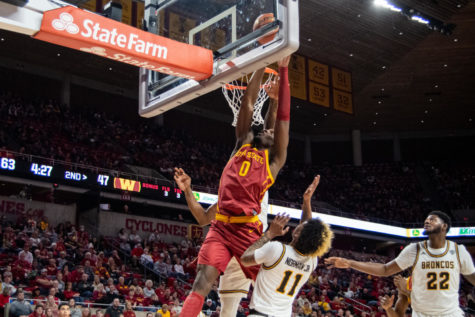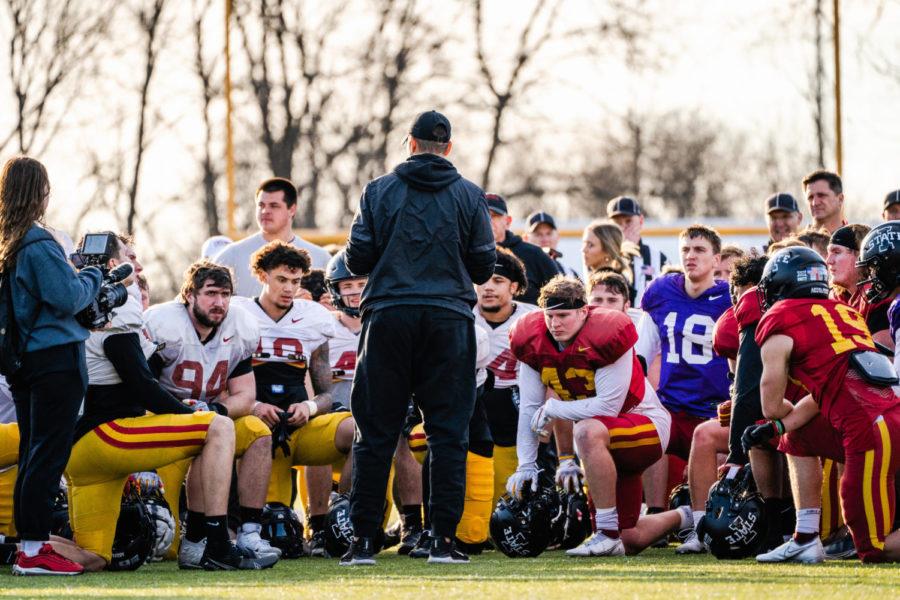How Iowa State is navigating the “Wild West” that is NIL
Matt Campbell speaks to his team after a Spring football practice at Ames High School.
January 23, 2023
Since the allowance by the NCAA for athletes to profit off their name, image and likeness (NIL), local collectives and merchandise companies are navigating the space with the intent to benefit Iowa State athletes and the community.
While there is some truth to the nickname of the “Wild West” there are also some common misunderstandings amongst collegiate fanbases.
It is not the “Wild West” because people are breaking rules and not suffering any reprecussions, We Will Collective Executive Director Brent Blum said, but instead because there are not many rules, and they vary from state to state and school to school.
“There just really aren’t any regulations,” Blum said. “It’s not that there’s just a bunch of ridiculous things going on or things are illegal by any means but just that there’s nobody there to really monitor and put up guardrails for what’s going on.”
When the decision was initially made, some players quickly began to work with businesses while others took longer. Things took a drastic turn when schools began to work with NIL collectives, in which a fund is divided up between athletes.
The Cyclones officially joined the collective game back in April 2022 with the launch of the “We Will” collective. This collective allows athletes to work with the Iowa State and Ames communities, allowing them to profit off of their name, image and likeness in return.
“Donors figured out that if they could pool their resources, they could essentially make more of an impact than just one business or one donor alone,” Blum said. “We have probably 1,500 donors that have contributed to the collective, and then in exchange for the student-athletes to be compensated for their name, image and likeness, they first have to do something with a non-profit in the community.”
The next big project coming up for the Cyclones in the NIL space is the Iowa State NIL Store that is expected to open soon. Around 40 athletes are expected to be included in Campus Ink’s website launch for fans to buy liscensed merchandise from some of their favorite Cyclones.
The store is expected to sell t-shirts, crewnecks, sweatshirts and more initially and will ultimately expand to more items, such as jerseys.
A big part of the Campus Ink process is allowing athletes to exercise their creative freedom and marketing skills by helping to decide on what products will go on their portion of the online store.
Athletes can use this opportunity to learn about design, sales and more, all while making between $8 to $15 per piece of merchandise that is sold.
“We want them to be involved in the process,” NIL Director at Campus Ink Adam Cook said. “It’s a great opportunity to learn how to build your brand, to learn something about maybe digital media, e-commerce and design.”
Blum discussed what some fans believe of how much and how the athletes are making this NIL money but said some of this is just misconception. He said some of these athletes have no time for a job while juggling their sport and school, and this can be a way to remain financially stable.

“I would say that a mischaracterization is these student-athletes are making hundreds of thousands of dollars,” Blum said. “In reality, it’s more like a couple hundred dollars here, a thousand dollars here that they then can use to help out family back home or have one-off expenses here or there.”
It’s not the “Wild West” because people are breaking rules and not suffering any reprecussions, Blum said, but instead because there are not many rules, and they vary from state to state and school to school.
“There just really aren’t any regulations,” Blum said. “It’s not that there’s just a bunch of ridiculous things going on or things are illegal by any means but just that there’s nobody there to really monitor and put up guardrails for what’s going on.”
Another area that can get confusing at times for fans is how the schools can work with these athletes on their NIL deals.
The department cannot help to facilitate these deals nor make the decisions on deals for them. What they can do is help to educate the athletes before they make their own decisions.
“The institution is not supposed to be involved in procuring particular deals or specific deals on behalf of student-athletes,” Iowa State Faculty Athletics Representative Tim Day said. “However, there’s a lot of things we can do to help them get there within the rules, and that would be things like education on reading contracts [and] education on how they can amplify their own brand.”
With the lack of regulations that there are and the variation from school to school, Day said there can be a bit of skew in the NIL statistics out there.
“The information that we can get about what’s happening in the name, image and likeness space is largely that that’s reported by student-athletes and by their, kind of, agents,” Day said. “Both of those entities probably have an interest in–exaggerating is a strong word–but in making those deals perceive to be as large as possible.”
Cook and the staff at Campus Ink understand that there is confusion in the rules, so they have taken precautions to make sure they do not get the athletes or the university into any trouble with the NCAA.
“What we try to do is just be really transparent, be an advocate for both the student-athletes and the schools in providing a compliant solution on both of those sides,” Cook said.







